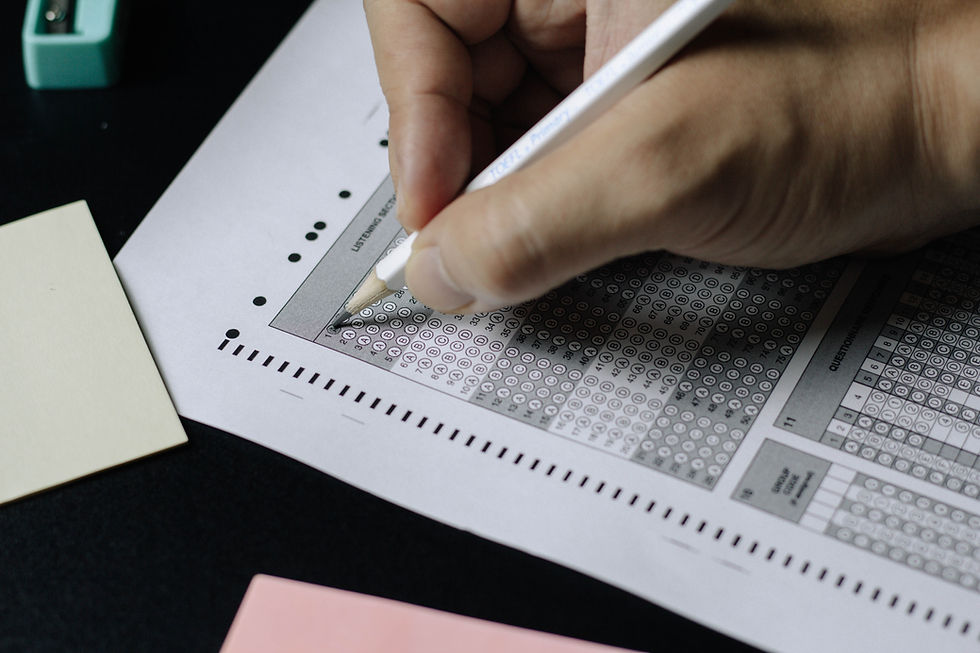
In their latest bid to stay relevant, the College Board announced some big changes to both the PSAT and SAT tests today. Here's what you need to know.
No More Paper Tests!
Perhaps the most notable part of today's announcement is that the College Board is phasing out paper-and-pencil testing for both the PSAT and SAT tests and moving to a 100% digital format. The online roll-out will happen over the next two years. The SAT will be delivered online to students testing outside of the US in 2023 and then within the US in 2024; the PSAT/NMSQT and PSAT 8/9 will be administered digitally for all students in 2023, with PSAT 10 following in 2024.
Students will be able to complete the new online test on their own laptop or tablet, a school-issued device, or one borrowed from the College Board. Though students will be able to use their own devices to test, this doesn't mean they'll be allowed to take the SAT at home. Everyone will still be required to complete the test at their school or another testing center where a proctor is present.
As for technical difficulties, the press release promises that "if a student loses connectivity or power, the digital SAT has been designed to ensure they won't lose their work or time while they reconnect." Given the College Board's checkered past regarding tech issues when testing online, let's hope they can build a better experience that's less stressful for all involved.
A Unique Test for Each Student
Paper testing means that huge numbers of students take the same exact version of a test (what's called a "test form"). If information from a particular test form is leaked, any student who took that test gets their scores canceled and entire test dates get called off. It's chaotic.
Because SAT administration will no longer rely on paper, students taking the test digitally can take their own unique form, making it pretty much impossible for test material and answers to be leaked. The new SAT is also supposed to make use of "adaptive testing," a testing technique in which the computer assesses the test-taker's ability in real-time and presents them with questions of varying difficulty levels from a question bank. If you're confused as to how that's going to work with the SAT, a test that famously uses a common scoring scale, you're not alone! I have no idea how this is going to work. I'm just delivering the news!
A Shorter SAT
The digital exam will be shorter than the current one, clocking in at about 2 hours rather than 3. The College Board says this change will result in more time per question. This is good news for the many students who currently struggle with the SAT's strict timing, especially on its Reading section. Speaking of the Reading section, passages are going to shortened and adapted to "reflect a wide range of topics that represent the works students read in college." Given what the College Board has thought is relevant so far, I'm especially interested to see what types of passages are in store.
Calculators Allowed for the Entire Test
Anyone familiar with the SAT knows that its Math section is broken up into two parts: one in which no calculators are allowed and another that welcomes calculator use. The new SAT will allow calculator use on the entire Math section. No calculator handy? Apparently, a graphing calculator will be built into the testing app.
Faster Score Reports
Digital testing allows for faster score reporting. Students will no longer have to languish for weeks after their test date, waiting on their scores; instead, score reports are projected to be delivered within days of the test date. This will make it easier for students to decide which scores (if any) they'd like to send to colleges faster than before and also when/if they want to test again to go for a higher score.
The Bottom Line
As someone generally critical of the College Board, it's difficult not to see these changes as a last-ditch effort to get as many students as possible to take the test before the SAT is abandoned entirely as a metric for college readiness. However, as someone who wants all students to be able to meet their big goals for the future, if these changes result in making the test more accessible for those who actually want to take it, that's a good thing. We'll see how it all plays out.
Nina Calabretta is a college English instructor, tutor, and writer native to Orange County, CA. When she’s not writing or helping students improve their skills as readers, writers, and critical thinkers, she can be found hiking the local trails with friends and family or curled up with a good book and her cat, Betsy. She has been part of the ThinquePrep team since 2018.
With offices located in beautiful Orange County, ThinquePrep specializes in the personalized mentorship of students and their families through the entire college preparation process and beyond. With many recent changes to college admissions - standardized tests, financial aid, varied admissions processes - the educational landscape has never been more competitive or confusing. We’re here from the first summer program to the last college acceptance letter. It’s never too early to start thinking about your student’s future, so schedule your complimentary consultation today!



Comments